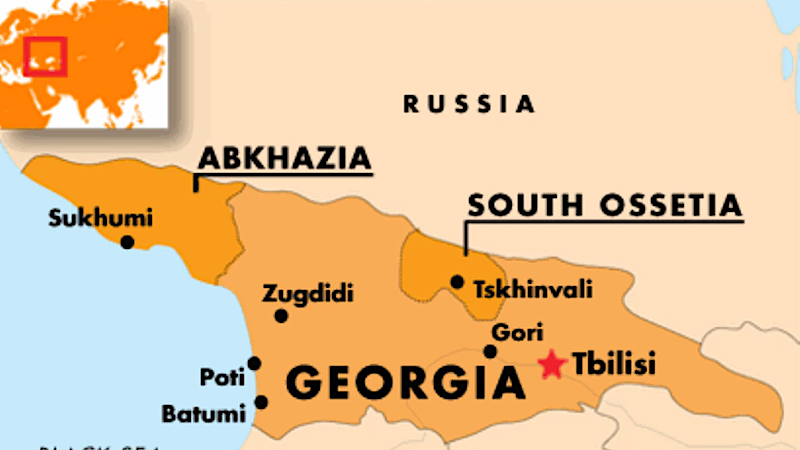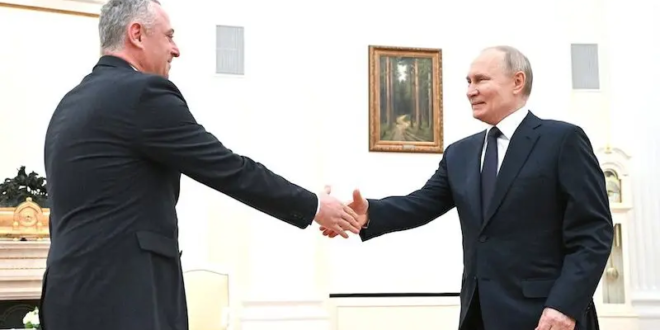On March 1, Georgia’s separatist region of Abkhazia held a second round of presidential elections. The turnout stood at nearly 70 percent, with 100,412 ballots cast. Badra Gunba, the pro-Russian acting president, was declared the winner over Adgur Ardzinba, leader of the opposition, with more than 54 percent of the votes (54,954 votes in total) (Civil.ge, March 3).
Russian President Vladimir Putin congratulated Gunba and wished that “friendly, allied Russian-Abkhazian relations will continue to strengthen for the benefit of our fraternal peoples” (Interpressnews, March 2). The Georgian government and the European Union have condemned the election, dismissing its legitimacy (Interpressnews, March 3). Similar statements were made by Azerbaijan, Ukraine, the United Kingdom, and others following the first round of elections in February (Azerbaijani Foreign Ministry, February 15; Ukrainian Foreign Ministry, February 16; Gov.uk, February 27; Civil.ge, March 3).
Moscow’s support of Abkhazia serves as a valuable mechanism for sustaining its influence among the Abkhaz population and the region as a whole (see EDM, January 22, February 12). Over the past months, Russia, one of Abkhazia’s leading investors, has sought not only to maintain but to expand its support for the separatist region (Kremlin.ru, March 5). This was unexpected given Russia’s prolonged war against Ukraine, which has drained Russian financial and political resources (see Strategic Snapshot, March 2025).

Map of Georgia highlighting locations of Abkhazia and South Ossetia. Source: RFE/RL
Early elections in the separatist region of Abkhazia were announced after the region’s former de facto leader, Aslan Bzhania, stepped down in November 2024 amid mass protests (Civil.ge, November 19, 2024). The protests were in response to a “property agreement” which sparked fears that the influx of Russian money would eventually undermine the livelihoods of the Abkhaz population (Kremlin.ru, November 2, 2024; see EDM, November 26, 2024). The agreement meant that Russian entities would be exempt from paying property taxes on new investment projects in Abkhazia for eight years. This, in turn, raised concerns that Georgian investors with Russian passports, under the guise of Russian business interests, would purchase Abkhazian land and construct apartments (see EDM, July 31, 2024).
When the de facto Abkhaz government blocked the agreement from becoming law, Russia responded by cutting electricity supplies and financial support (see EDM, January 22). This led to a severe energy crisis, characterized by rolling blackouts and requests for additional energy supplies from Georgia (The Moscow Times, December 23, 2024). In response, Russia initiated “humanitarian” electricity deliveries (Interfax, December 22). In the meantime, the salaries of public sector employees were halted due to lack of funding (Sputnik, December 5, 2024; Izvestiya, December 6, 2024). Nearly all salaries of officials, teachers, and other personnel in Abkhazia are directly funded by the Russian budget (Russian Government; Meduza, February 6).
The newly elected Gunba represents a shift back to positive Abkhaz-Russian relations, as he is a staunchly pro-Russian politician, as were many before him (Radio Free Europe/Radio Liberty, March 3). He received a wide level of support from Moscow, which is unsurprising given that his election increases the likelihood of new legislation on foreign investments being passed (Kremlin.ru, March 5). Russian leadership, however, is also signaling that a failure to implement the legislative changes could result in a terrible situation for the Abkhaz population, as seen when Russia cut off Abkhazia’s electricity supply (see EDM, January 22).
With the potentially decisive advantage gained over Ukraine as Russia and the United States engage in peace talks, Moscow will now have more time and energy to push forward its agenda in the South Caucasus (see EDM, March 21). Moscow has different goals in the South Caucasus than in Ukraine. Russia’s recent moves, such as making progress on construction of the airport in Sukhumi, reinstating financial and social support for the separatist region and holding frequent political meetings with the de facto leadership of the statelet, signal that Moscow is now intent on fully transforming the fragile bilateral relations (see EDM, November 20, 2023; Civil.ge, February 27). These efforts create the conditions that enable Russia to maintain a central role in the geopolitics of the South Caucasus.
The perception that Russia is no longer interested in keeping Abkhazia under its control, in the context of its prolonged war against Ukraine and improved relations with Georgia, may no longer be the case. On the contrary, with the promise of a return to pro-Russian political leadership in Abkhazia, Moscow has signaled a desire for greater sway over the separatist region.
 Eurasia Press & News
Eurasia Press & News



